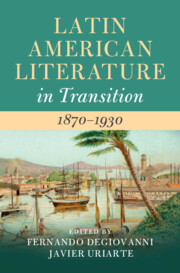Book contents
- Latin American Literature in Transition 1870–1930
- Latin American Literature in Transition
- Latin American Literature in Transition 1870–1930
- Copyright page
- Contents
- Figures
- Contributors
- Acknowledgments
- Introduction
- Part I Commodities
- Part II Networks
- Part III Uprisings
- Part IV Connectors
- Chapter 16 Money
- Chapter 17 Bodies
- Chapter 18 Travel
- Chapter 19 War
- Chapter 20 Science
- Chapter 21 Visual Technologies
- Part V Cities
- Index
- References
Chapter 16 - Money
from Part IV - Connectors
Published online by Cambridge University Press: 14 January 2023
- Latin American Literature in Transition 1870–1930
- Latin American Literature in Transition
- Latin American Literature in Transition 1870–1930
- Copyright page
- Contents
- Figures
- Contributors
- Acknowledgments
- Introduction
- Part I Commodities
- Part II Networks
- Part III Uprisings
- Part IV Connectors
- Chapter 16 Money
- Chapter 17 Bodies
- Chapter 18 Travel
- Chapter 19 War
- Chapter 20 Science
- Chapter 21 Visual Technologies
- Part V Cities
- Index
- References
Summary
This chapter proposes to trace a map following the economic and literary route of money in Latin America between 1890 and 1930, in tune with what was happening in Western Europe and the United States. Money, with all its ubiquity between real and virtual financial capital, had an expansive and global power that altered local imagination: In Latin America, due to both literary and economic forces, we see the proliferation of what this chapter dubs “fictions of money.” Furthermore, it focuses on the Argentine, Brazilian, and Guatemalan cases, given the striking publication of financial novels immediately after the economic crises provoked by fluctuations in the stock market and unbridled speculation, which served to process the actual circulation of money and to negotiate the social experience related to it.
Keywords
- Type
- Chapter
- Information
- Latin American Literature in Transition 1870–1930 , pp. 239 - 251Publisher: Cambridge University PressPrint publication year: 2022



